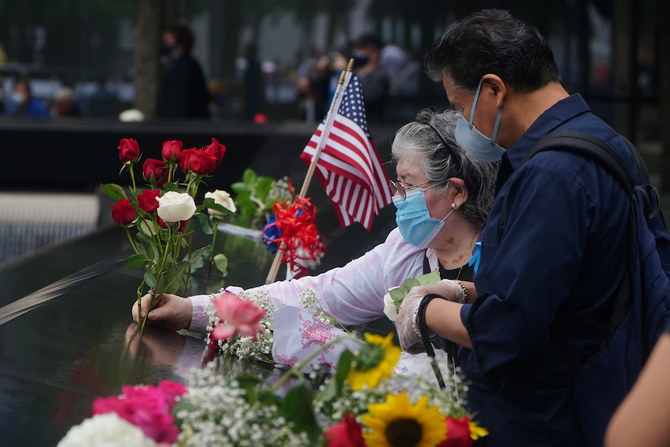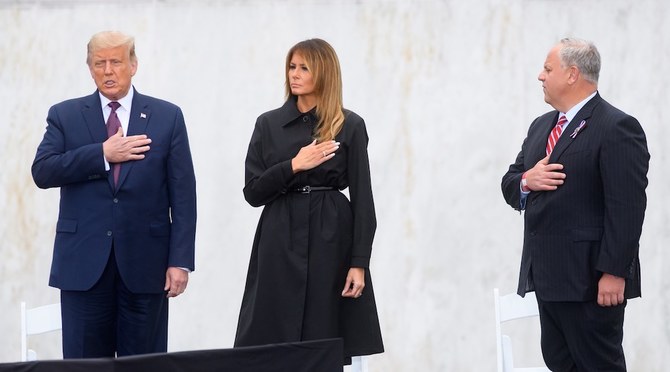WASHINGTON: Americans commemorated 9/11 Friday as another national crisis reconfigured memorial ceremonies, dividing some victims’ families over coronavirus safety precautions, and a presidential campaign carved a path through the observances.
In New York, victims’ relatives gathered Friday morning for split-screen remembrances at the World Trade Center’s Sept. 11 memorial plaza and on a nearby corner, set up by separate organizations.
Standing on the plaza, with its serene waterfall pools and groves of trees, Jin Hee Cho said she could not erase the memory of the death of her younger sister, Kyung, in the collapse of the trade center’s north tower.
“It’s just hard to delete that in my mind. I understand there’s all this, and I understand now that we have even COVID,” said Cho, 55. “But I only feel the loss, the devastating loss of my flesh-and-blood sister.”
The ruins of the shattered World Trade Center have since been replaced by a glittering $25 billion complex that includes three skyscrapers, a museum and the memorial with the goal that it would be again be an international hub of commerce.

Flowers are placed at the 9/11 Memorial & Museum in New York on Sept. 11, 2020, as the US commemorates the 19th anniversary of the 9/11 attacks. (AFP)
But the pandemic has rendered it somewhat of a ghost town, adding an eerie quality to the commemoration of the attack, with office workers staying home and tourists avoiding the memorial site.
Around the country, some communities canceled 9/11 ceremonies, while others went ahead, sometimes with modifications. The Pentagon’s observance was so restricted that not even victims’ families could attend, though small groups could visit its memorial later in the day.
On an anniversary that fell less than two months before the presidential election, President Donald Trump and Democratic challenger Joe Biden both headed for the Flight 93 National Memorial in the election battleground state of Pennsylvania — at different times of day. Biden also attended the ceremony at ground zero in New York, exchanging an elbow bump with Vice President Mike Pence before the observance began.
In short, the 19th anniversary of the deadliest terror attack on US soil was a complicated occasion in a maelstrom of a year, as the US grapples with a pandemic, searches its soul over racial injustice and prepares to choose a leader to chart a path forward.
We'll #NeverForget those we lost on 9/11 and in the years since. We'll #NeverForget the bravery of the first responders, families of those we lost, and Americans nationwide.
I was proud to stand with VP Biden, Governor Cuomo, so many more at Ground Zero as we remember that day. pic.twitter.com/SFf1XYZrVX
— Chuck Schumer (@SenSchumer) September 11, 2020
Still, families say it’s important for the nation to pause and remember the hijacked-plane attacks that killed nearly 3,000 people at the trade center, at the Pentagon outside Washington and in a field near Shanksville, Pennsylvania, on Sept. 11, 2001 — shaping American policy, perceptions of safety and daily life in places from airports to office buildings.
“People could say, ‘Oh, 19 years.’ But I’ll always be doing something this day. It’s history,” said Annemarie D’Emic, who lost her brother Charles Heeran, a stock trader. She went to the alternative ceremony in New York, which kept up the longstanding tradition of in-person readers.
Speaking at the Pennsylvania memorial, Trump, who did not attend the ceremony in his home city and sent Pence in his stead, recalled how the plane’s crew and passengers tried to storm the cockpit as the hijackers as headed for Washington.
“The heroes of Flight 93 are an everlasting reminder that no matter the danger, no matter the threat, no matter the odds, America will always rise up, stand tall, and fight back,” the Republican president said.

US President Donald Trump speaks at a 19th anniversary observance of the Sept. 11 terror attacks, at the Flight 93 National Memorial in Shanksville, Pennsylvania, Friday, Sept. 11, 2020. (AP)
Trump and his wife Melania listened in silence as the names of the 40 passengers and crew killed aboard Flight 93 were read aloud — with two bells tolling after the reading of each one.
In brief prepared remarks, the incumbent — who is hoping to defeat Biden and win a second term — paid “tribute to their sacrifice” along with all those who perished in the attacks.
“The only thing that stood between the enemy and a deadly strike at the heart of American democracy was the courage and resolve of 40 men and women – the amazing passengers and crew of Flight 93,” Trump told the crowd, adding “America will never relent in pursuing terrorists that threaten our people.”
He also honored first responders as well as military personnel who fought to “preserve our freedom” in the subsequent wars launched under former president George W. Bush.
“We resolve to stand united as one American nation, to defend our freedoms, to uphold our values, to love our neighbors, to cherish our country.... and to never, ever forget,” Trump said.

US President Donald Trump places a wreath at a 19th anniversary observance of the Sept. 11 terror attacks, at the Flight 93 National Memorial in Shanksville, Pennsylvania, Friday, Sept. 11, 2020. (AP)
It was a rare call for unity from a leader who normally plays political divisions to his advantage.
Biden, who did not cross paths with Trump, visited the memorial later Friday, laid a wreath and greeted relatives of one of the slain crew members, First Officer LeRoy Homer.

US Democratic presidential nominee and former Vice President Joe Biden and his wife, Jill, greet family members of victims after laying a wreath in front of her brother, Leroy Homers name at the Wall of Names following a ceremony at the Flight 93 National Memorial commemorating the 19th Anniversary of the crash of Flight 93 and the terrorist attacks on Sept. 11, 2020 in Shanksville, Pennsylvania. (Getty Images/AFP)
Biden pledged not to make any news during the day with the Nov. 3 election now less than two months away.
“I’m not going to talk about anything other than 9/11. We took all our advertising down. It’s a solemn day, and that’s how we’re going to keep it, okay?,” Biden said.
Biden: “I’m not going to make any news today. I’m not going to talk about anything other than 9/11. We took all our advertising down. It’s a solemn day. That’s how we’re going to keep it, OK? You can determine whether I make news but I’m not going to be holding any press confs.” pic.twitter.com/svpTXi6O3J
— Jennifer Epstein (@jeneps) September 11, 2020
At the Sept. 11 memorial in New York hours earlier, Biden offered condolences to victims’ relatives including Amanda Barreto, 27, who lost her aunt and godmother in the attacks. She said Biden “wanted to let me know to keep the faith” and told her he understood what it meant to lose a loved one. His first wife and their daughter died in a car crash, and his son Beau died of brain cancer.
Biden didn’t speak at the ceremony, which has a longstanding custom of not allowing politicians to make remarks and reserves that privilege to the close ones of victims.

US Democratic presidential candidate Joe Biden prays as he attends the 19th September 11 commemoration ceremony at the National Memorial & Museum in New York, Sept. 11, 2020. (AFP)
Biden then tweeted: “As a nation, we must never forget those we lost on 9/11 and the incredible bravery of our first responders. Though the wounds of that day will never fully heal, the spirit of Americans recovered as it always does — unbowed by the efforts of those who strike against it.”
And now, as then, we owe it to them to come together as a nation — so that Americans can once again do what we did so bravely nineteen years ago: turn from tragedy to purpose, rebuild our lives, and begin, in time, to heal.
— Joe Biden (@JoeBiden) September 11, 2020
In addition to stopping by the official Ground Zero museum ceremony, Pence attended another nearby commemoration organized by the Stephen Siller Tunnel to Towers Foundation, where some 100 relatives gathered to read the names of love ones they lost.
The vice president delivered a brief address and his wife, Karen, read a well-known verse from the Bible.
“For the families of the lost and friends they left behind, I pray these ancient words will comfort your heart and others,” said the vice president, drawing applause from the audience of roughly 200.
Formed in honor of a firefighter killed on 9/11, the foundation felt in-person readers were crucial to the ceremony’s emotional impact and could recite names while keeping a safe distance. By contrast, recorded names emanated from speakers placed around the memorial plaza. Leaders said they wanted to keep readers and listeners from clustering at a stage.
As in past years on the plaza, many readers at the alternative ceremony added poignant tributes to their loved ones’ character and heroism, urged the nation not to forget the attacks and recounted missed family milestones: “How I wish you could walk me down the aisle in just three weeks,” Kaitlyn Strada said of her father, Thomas, a bond broker.

Family members of victims sits along the edge of the South pool during ceremonies marking the 19th anniversary of the Sept. 11, 2001 attacks on the World Trade Center at the 911 Memorial in the Manhattan borough of New York City, New York, US, Sept. 11, 2020. (Reuters)
One reader thanked essential workers for helping New York City endure the pandemic, which has killed at least 24,000 people in the city and over 190,000 nationwide. Another reader, Catherine Hernandez, said she became a police officer to honor her family’s loss.
Other victims’ relatives, however, weren’t bothered by the switch to a recording at the ground zero ceremony.
“I think it should evolve. It can’t just stay the same forever,” said Frank Dominguez, who lost his brother, Police Officer Jerome Dominguez.

The ringing of bells as names are called during a ceremony at the Flight 93 National Memorial commemorating the 19th anniversary of the crash of Flight 93 and the September 11th terrorist attacks in Shanksville, Pennsylvania. (Getty Images/AFP)
The Sept. 11 memorial and the Tunnel to Towers foundation also tussled over the Tribute in Light, a pair of powerful beams that shine into the night sky near the trade center, evoking its fallen twin towers. The 9/11 memorial initially canceled the display, citing virus safety concerns for the installation crew. After the foundation vowed to put up the lights instead, the memorial changed course with help from its chair, former Mayor Mike Bloomberg, and Gov. Andrew Cuomo.
Tunnel to Towers, meanwhile, arranged to display single beams for the first time at the Shanksville memorial and the Pentagon.
Over the years, the anniversary also has become a day for volunteering. Because of the pandemic, the 9/11 National Day of Service and Remembrance organization is encouraging people this year to make donations or take other actions from home.
(With AP, AFP and Reuters)
































